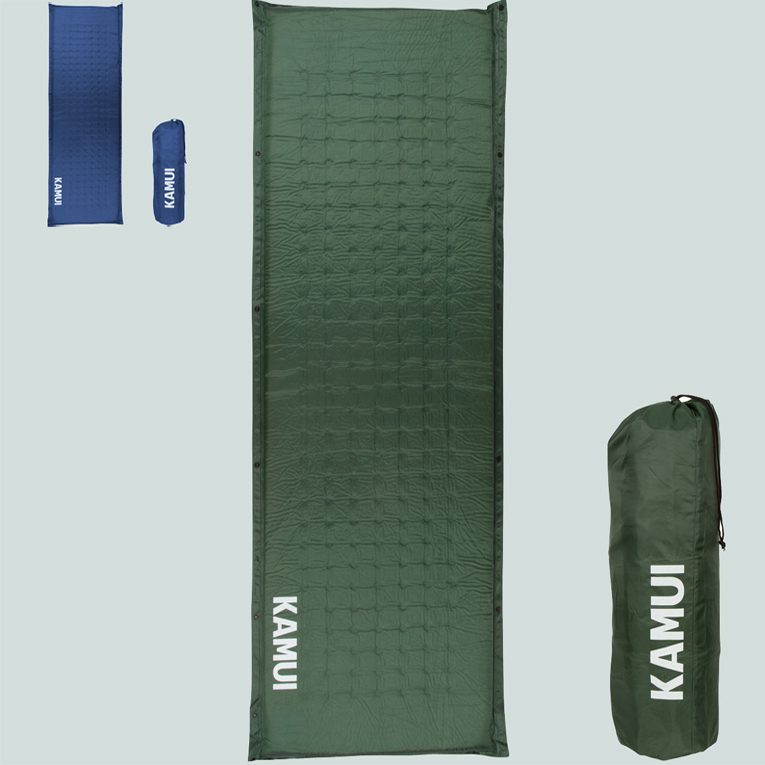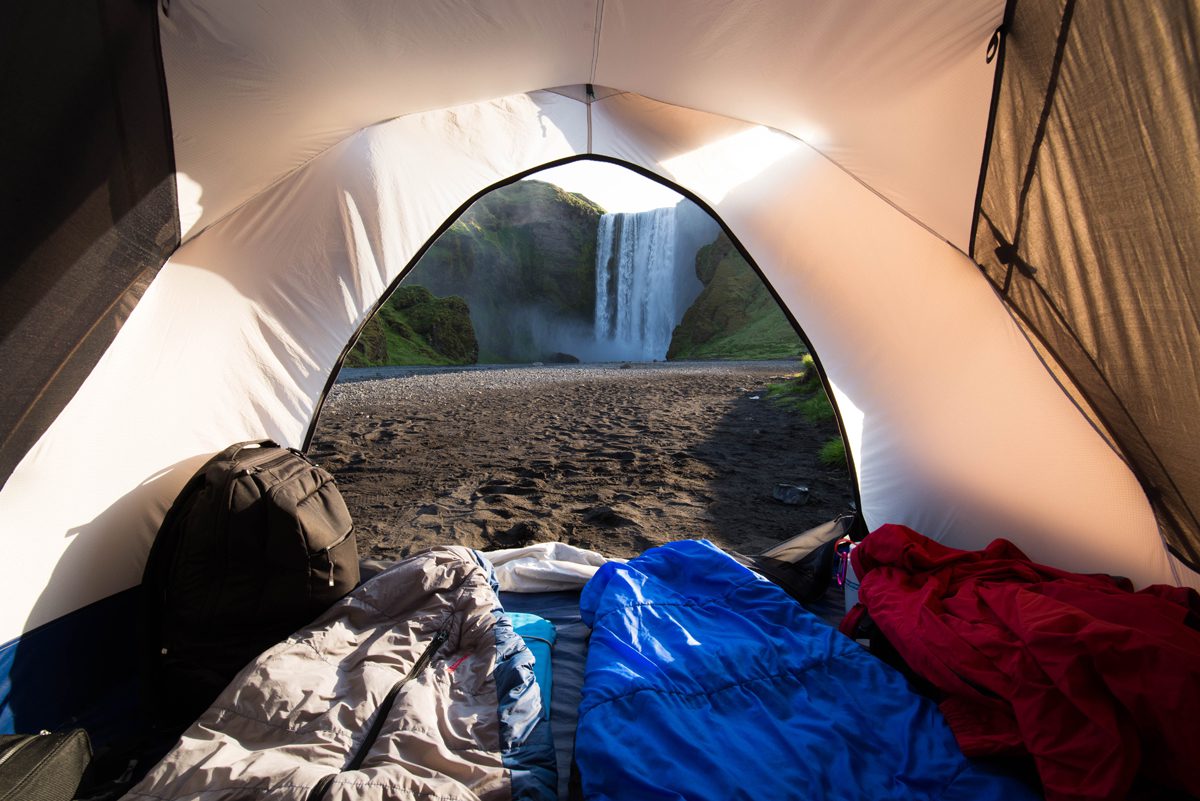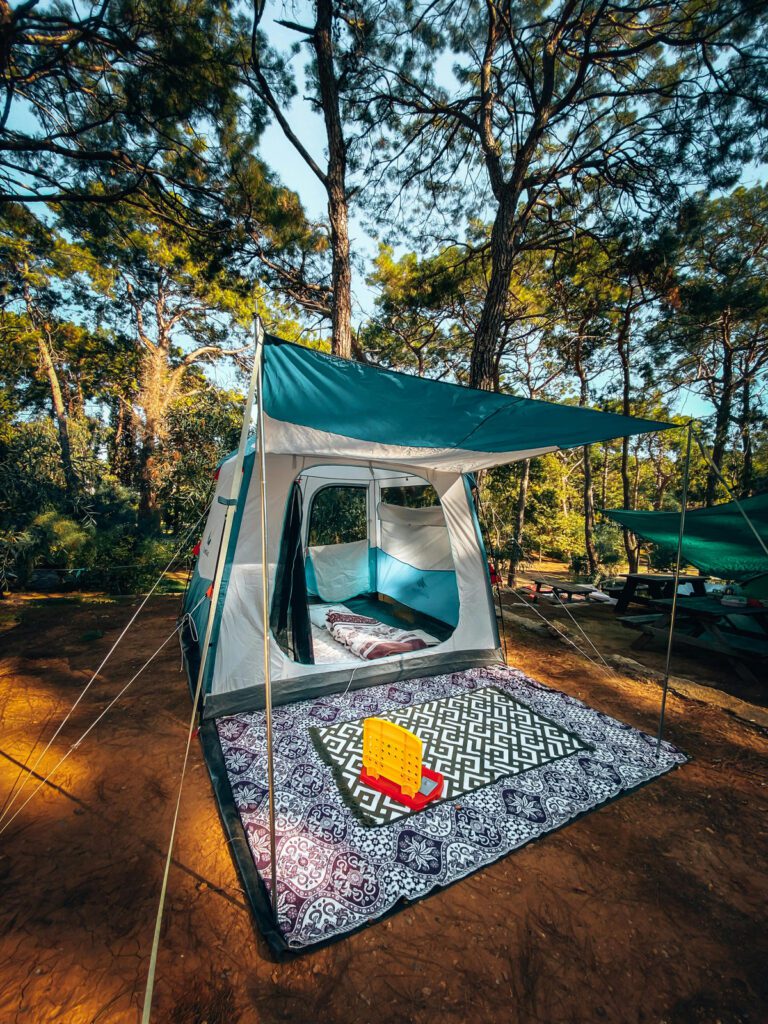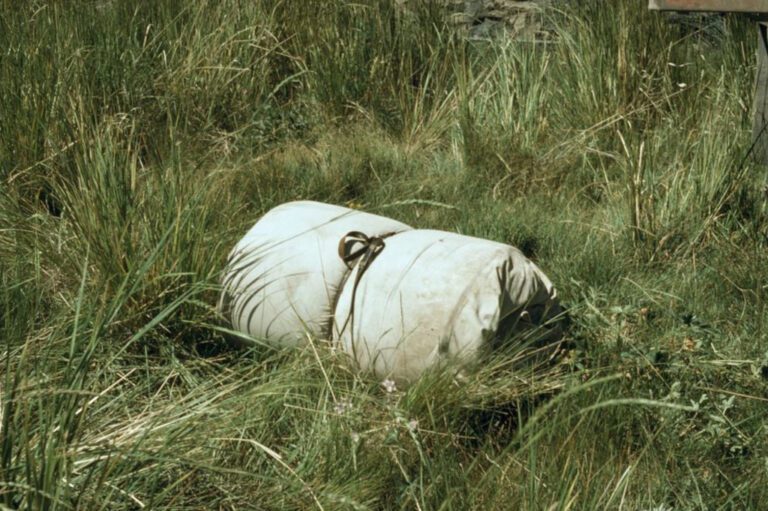Phone
+1-650-666-095
Contact E-mail
[email protected]
Address
16192 Coastal Hwy, Lewes, DE 19958-3608
Self Inflating Sleeping Pad vs. Foam Mat: Pros and Cons


Are you thinking of buying a new sleeping pad for your hiking and camping adventures, and you can’t seem to make a choice? Today, when there is so much to choose from in terms of camping gear, we understand why it might be hard to find the correct answer. That is why we are bringing you this self inflating sleeping pad vs. foam article.
This article highlights how to use and how to choose either a self inflating open-cell or a closed cell foam mat in your future outings, what to use them for and all the possible problems you might face while doing so. The catch with camping and hiking gear is to know what it’s used for and whether it matches your intended use.
We hope this short article will help you decide on self inflating sleeping pad vs. foam, and which choice is the better one for you.
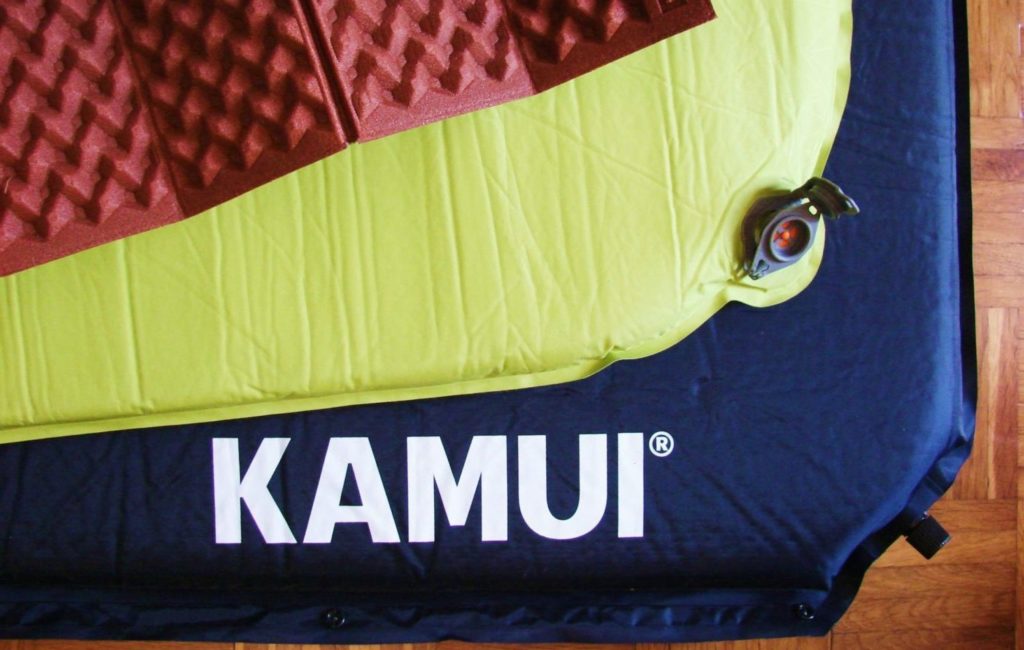

About Self Inflating Sleeping Pads
Self inflating open cell or just open cell sleeping pads are camping gear used to isolate you and your sleeping bag from the cold ground. They make these pads out of foam material that inflates on the inside, and airtight material on the outside. It inflates by itself, and that is why it’s called a self inflating sleeping pad.
Don’t confuse open cell sleeping pads with air mattresses! We have another article talking about the differences between these two types of pads.
Self inflating sleeping pads are bulkier than the air pad type. On the contrary, the size of the pad offers a way to keep you off the ground, and the open cell foam inside of it is a much better insulator than any other type of sleeping material. In the end, these pads are a combination of foam, that expands once the pad is open and the air flows in thanks to the vacuum it forms. When deflated, some models can be the size of a water bottle, but you can find differing sizes for car camping too.
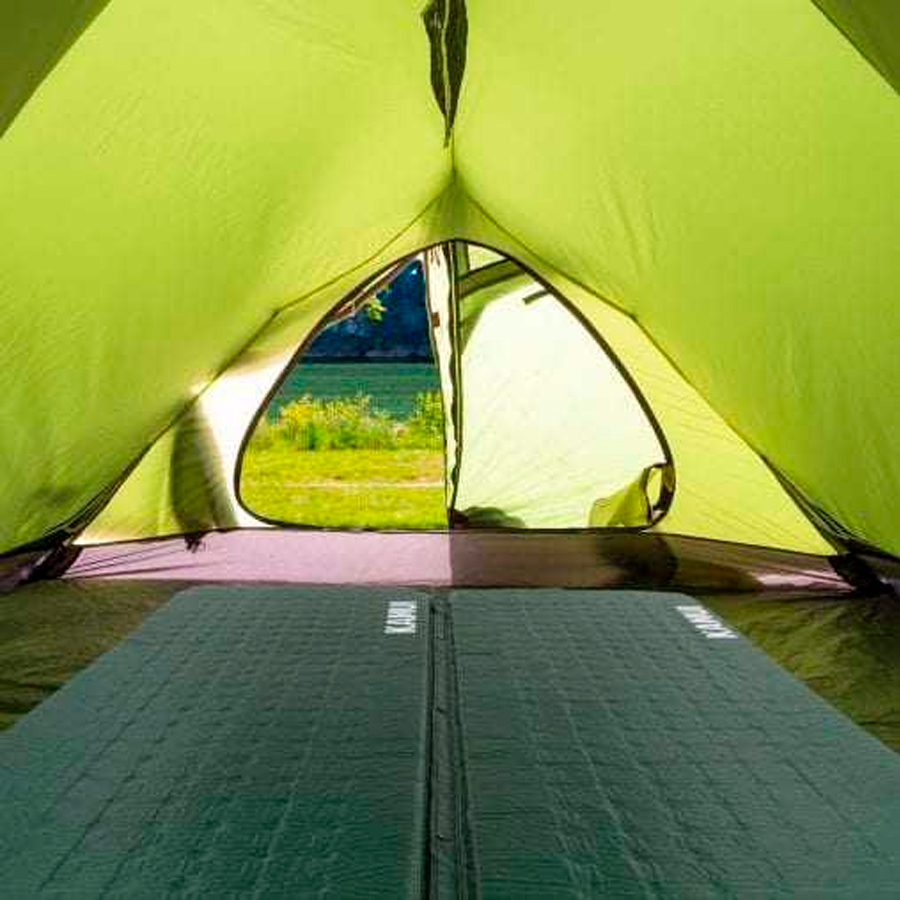

Look at these beauties as sleeping mattresses with an expanding sponge inside, that only expand with air (never water!). They inflate to a certain amount of firmness once open, and you can add manual breathes of air to reach maximum firmness.
Most campers love these pads because they are easy to use, compact in size, and have very little chance of failing with a patch kit. If you want to learn more about how these inflatable sleeping pads work, you can check out more in our article.
Now, let’s move onto the pros and cons of the self inflatable sleeping pad in our self inflating sleeping pad vs. foam match.
Pros of Self Inflating Sleeping Pads
After looking at the basics of self inflating sleeping pads, it’s time to focus on why these types of camping mattresses are so good and why we recommend them. Next up are our pros for open cell foam mats:
- Easy use: The camping mat offers protection against a sleepless night in a super-easy way, and this means easy setup and easy deflation. that is why these sleeping mats are so popular.
- Self inflating: Just like the name says, these sleeping pads are easy to inflate, or they self-inflate. This means you can leave the pad inside your backpacking tent or camping hammock and proceed to have a good day. Once you’re back in the tent and ready to sleep, add a few breaths, and voila! Your sleeping pad is prepared for a good night’s sleep.
- Cushioning: Even on hard surfaces, your night will be well-slept because these mats offer to buffer depending on their width. The fact that they can withstand virtually any surface with their sponge-like open cell foam is a pro.
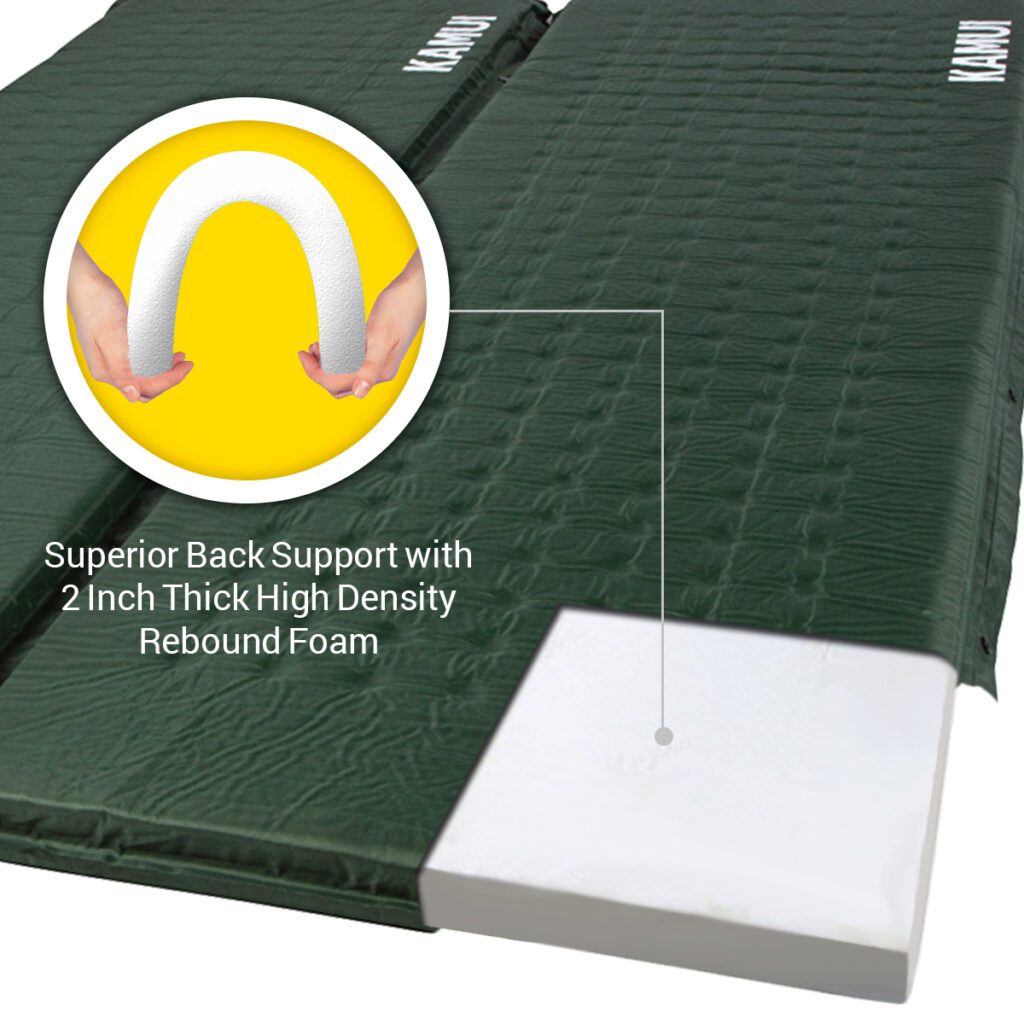

- Customizable firmness: Not all sleeping pads are equally cushioning, and that’s why they have their air valve, with which you can customize the firmness of the pad. If you want some extra bounciness, just deflate the pad to your wished firmness and proceed with your outdoorsy rest.
- Stackable and connectable: Some self inflating pads are connectable to the same type of pad, so you could create a double sleeping pad when in the tent. Additionally, you can also stack them vertically for some extra insulation.
- Light: We make most sleeping air mattresses of lightweight materials, with both the open-cell foam and outer fabric being foldable and feature a light weight.
- Durable: Even if you’re facing a leak on the trail, your sleeping mat will still function. That’s why backpackers love this pad type; just put some duct tape on the leak, and you’re ready to go. Nevertheless, open cell sleeping pads are durable, and a simple stick or rock will not be enough to puncture it.
- Insulating: Even when winter camping on a cold night, your trusted mat will keep you insulated. With something called R-Value, you can determine what type of weather to use your sleeping pad for, and you can read all about it in our article.
- Differs in size: It doesn’t matter if you’re tall or short. Sleeping pads are in all sizes and shapes, perfect for any body type. Just make sure you know the measurements of your pad if you’re buying online.
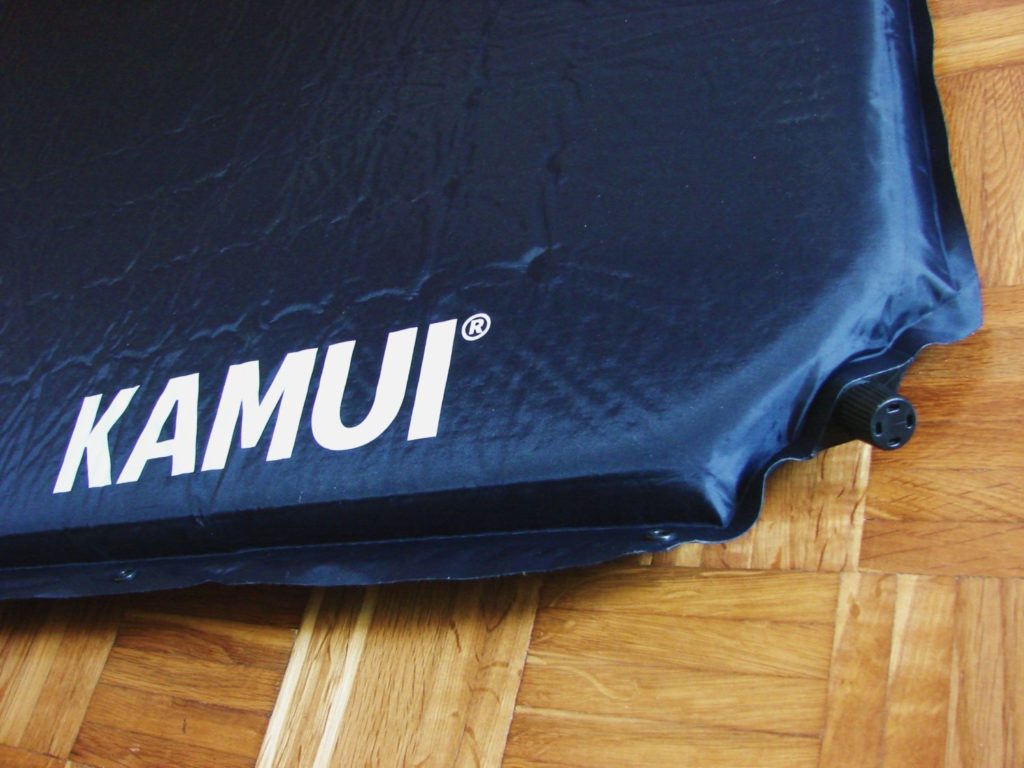

Cons of Self Inflating Sleeping Pads
It’s not all roses. There are some cons to these camping pads too, about which we have to be honest. Read through and figure out whether it’s a big no for you or just a possible inconvenience. Here are the cons in the self inflating sleeping pad vs. foam match:
- Heavy: They make some backpacking sleeping pads super light and portable, but others used for car camping and other camping activities could be on the heavy side. Figure if this might pose a problem for you and whether you’d like to have a lightweight sleeping pad with you.
- Hard to deflate: Some sleeping pads might require some extra work to be put in when deflating them. The process can take up to 10 minutes and require pushing air out of the mat more than once. If you want a super-easy breaking camp process, think whether a self inflating sleeping pad might be a good choice for you, or not.
- Noisy: Some materials on camping mats can be noisy, especially when moving around on them or switching sides if you’re a side sleeper. This can pose a problem for light sleepers in the camp.
- Punctures: If you place your camping pad on a cactus or sharp rock, your sleeping pad might puncture. In this case, you can bring your repair kit with you or a piece of duct tape, to mend the hole. When using open cell pads, you need to know these pests can occur, but they probably won’t pose a big problem to you.
- Cost: We have to be honest, in our self inflating sleeping pad vs. foam match, the self-inflating type definitely costs more. Differing in size, weight, manufacturing, and R-Value, open-cell pads will always cost more. But budget-friendly options are still available on the market.
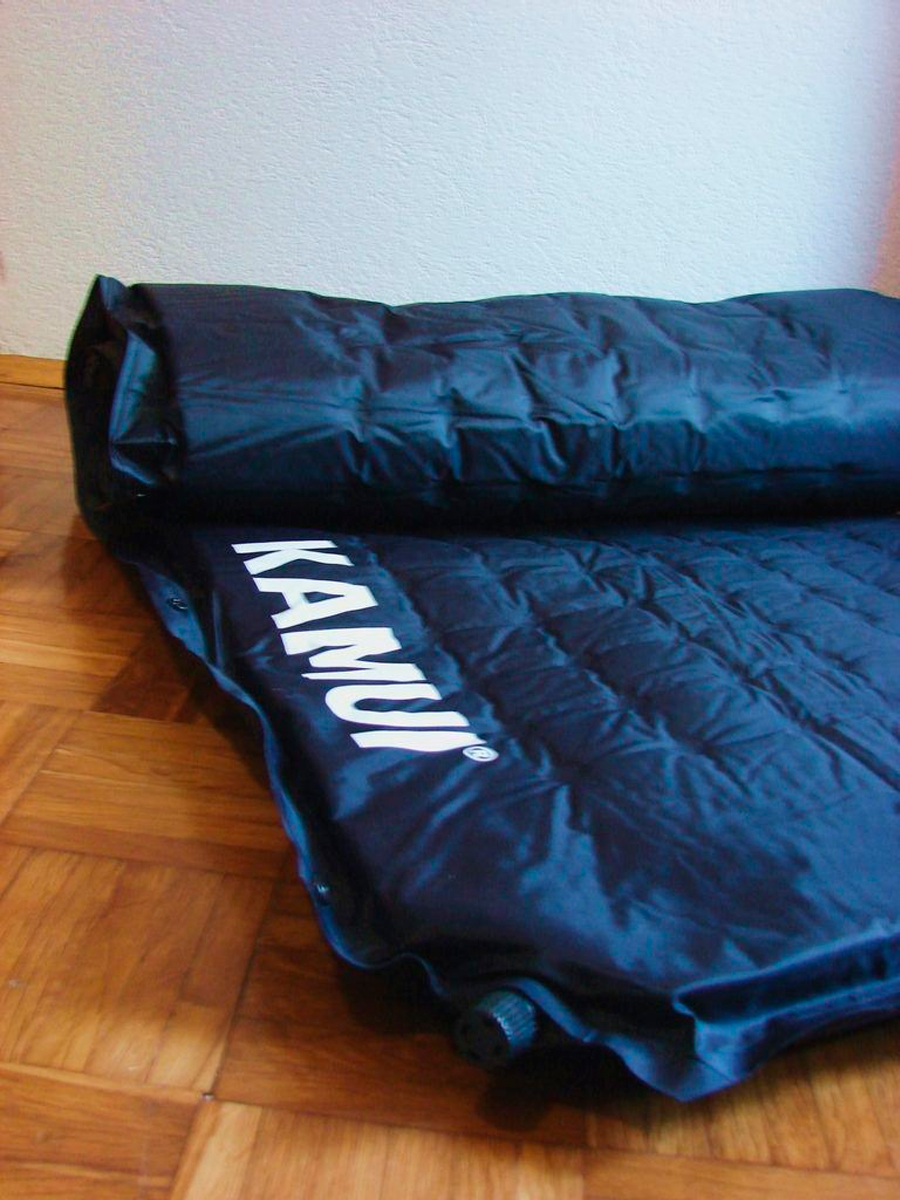

About Closed-Cell Foam Pads
Closed cell or just foam pads are made of a type of foam that is different from open-cell sleeping pads. We call this foam closed-cell foam since it doesn’t inflate, and these foam pads Closed-cell foam mats or CCF pads.
How do these pads work? The Closed foam is made of insulating foam and tiny bubbles of air inside it, making these pads stiff and uninflatable. In the end, when you use one of these camping pads, you are lying directly on the foam, with no outer material or air in between, like with the open-cell pads.
In terms of comfort, these pads can offer a comfortable night’s sleep, with some insulation too. Why they are so popular is their light weight! This means, foam sleeping pads are mostly just air and foam, and the weight for some models can be as low as 1 pound. You probably saw one basic foam pad on the back of a backpack somewhere and remembered how they look, since they roll-up. Some models are designed in a way that lets them fold like an accordion.
Next, let’s look at why we like and dislike these camping mats, with our pros & cons section.


Pros of Foam Mats
Closed cell sleeping pads are a great choice if you’re camping on a budget or are looking for a trustworthy pad to keep you rested. Next are the pros of using a foam mat on your next hiking adventure.
- Reasonable price: This gear can be found for up to $50, which isn’t a lot even if you’re hiking on a budget.
- No punctures: Yes, it’s true. No punctures can occur when using a foam mat. This means you can break off a chunk, or you can even puncture the pad, and it will still get back to its original shape. The reason behind this is that you’re lying on a significant section of just foam, with no vacuum inside.
- Easy setup: This type of sleeping pad is easy to set up, just like with the self inflating type. All you need to do is unroll it. Unlike the opposing model, the foam pad does not have to be deflated, making it an easy roll-up process too.
- Multiple uses: Need a butt pad? Somewhere to sit for a whole group? Or just your dog? Need a snack break? Use your foam pad, instead of bringing gear exclusively for those purposes.
- Light: With a weight of about 1 lb (0.45 kg), most average foam mats are very lightweight and would pose a great option when trekking and thru-hiking as an ultralight sleeping pad.
- Durable: Not just durable, these pads are reliable and generally last longer than the average camping sleeping pad out there. This is because it’s a whole sturdy bunch of foam, with no possibility of puncturing and breaking.
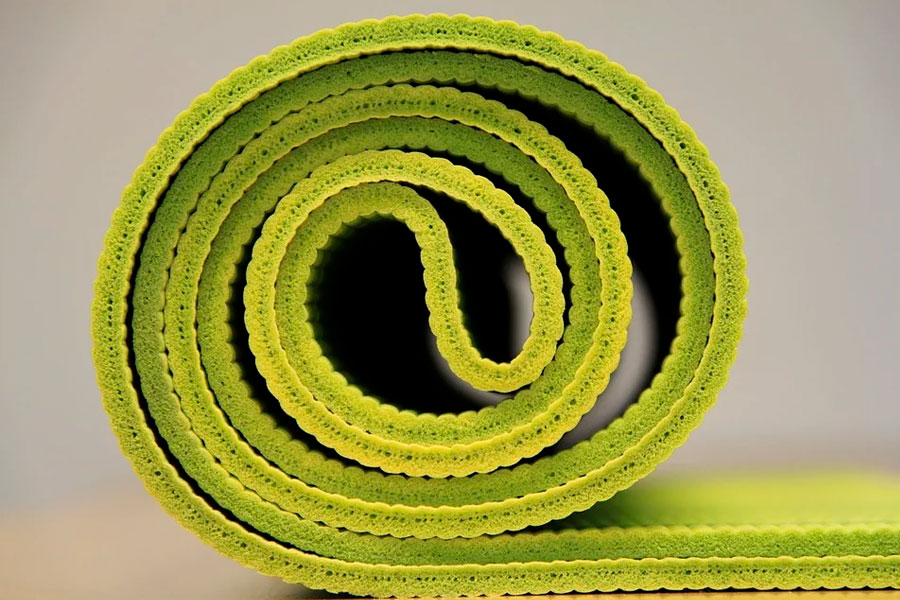

Cons of Foam Mats
Closed-cell foam models of pads have an impressive set of pros, but for some users, this piece of gear still doesn’t make the cut, and here is why:
- Uncomfortable: The item’s tiny width and sturdiness make it quite uncomfortable for some campers. But some people still swear by them and find them more comfortable than any other pad model. We guess it’s up to you to determine what works best for your back. While being made out of only foam and no air vacuum, foam pads tend to be too stiff for most users, and the material they are made out of too firm, making them uncomfortable. You can compare it to sleeping on a yoga mat.
- Low insulation: Foam mats offer lower R-values or insulation than air and other open-cell sleeping pads. Most have around 1.5-2 R-values, which is insufficient for a winter night.
- Sturdy: Even the packed size of foam mats is still bulky and can sit only outside your pack.
- Used in combination with other sleeping pads: Most experienced mountaineers love to use double padding when sleeping in the cold. This means most of them stack their air or open-cell pad on top of a thin foam mat to protect their upper pad and add extra insulation.


Self Inflating Sleeping Pad vs. Foam Comparison Table
Now that we have looked at both the pros, cons, and cons of self-inflating sleeping pads and foam mats, we are concluding. It is time to proceed with a comparison table, comparing what one model has and the other doesn’t. Let’s look at the technicalities:
| TYPE | 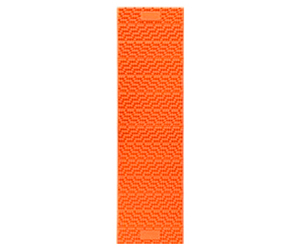  Foam mat | 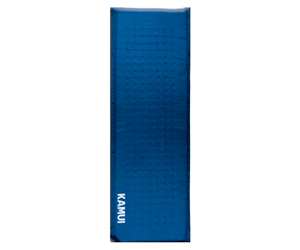  Self inflate |
|---|---|---|
| FEATURES | ||
| Price | ✓ | – |
| R-Value | – | ✓ |
| Sleep System | – | ✓ |
| Comfort | – | ✓ |
| Portability | ✓ | – |
| Ease of Use | ✓ | – |
| BEST USES | ||
| Car Camping | – | ✓ |
| Backpacking | ✓ | – |
| Sleep in vehicle | – | ✓ |
| Hammocking | – | ✓ |
Best Use for Self Inflating Sleeping Pad vs. Foam
Based on our simple comparison table, we have provided examples of the best use for Self-Inflating Sleeping Pads and Foam mats. This short but informative list will help you outline each pad’s qualities.
Car camping
Winner: Self-inflating sleeping pad
If you’re looking for a way to camp without moving too much, this type of camping is for you. Load your camping gear into the trunk and head for the closest national park. Now, don’t forget your trusted self-inflating sleeping pad, which might come in handy for a night out camping, unlike the foam mat, which can be stiffer.


Backpacking
Winner: Foam mat
If you need something reliable on your trip and want to be sure it won’t fail you, look for a lightweight backpacking sleeping pad. This means even a foam mat that is sturdy, light, and durable at the same time.
Sleeping in your vehicle
Winner: Self-inflating sleeping pad
If camping isn’t your thing and you love spending the night in your car—or maybe even if it’s the fastest way for you to set up camp—and comfort is your central theme here, a self-inflating sleeping pad will come in handy. An open-cell pad would be a delight compared to the sturdy and uncomfortable mat.
Hammocking
Winner: Foam mat
Do you love floating in mid-air on your comfortable hammock? Then a sleeping pad would be a total change for you. Since hammocks are comfortable by themselves, you don’t need anything else than a foam mat to keep your back insulated and comfortable.


Final Verdict: Self Inflating Sleeping Pad Vs. Foam Mat
After learning about Self-Inflating Sleeping Pads and Foam Mats and pointing out their pros and cons, we have come to the final verdict. We have even put them to the test in terms of specifications. So far, it has been hard to choose between the Self-Inflating Sleeping Pad, with its fantastic portability and insulation on one side, and the Foam Mat, with its simplicity and reliability.
After hours of research and testing, both indoors and outdoors, and after years of experience with both sleeping pad models, we concluded that the self-inflating sleeping pad is a better choice for campers and hikers alike who seek comfort and portability above all else.
But a foam mat would be the perfect choice if you want durability and love sleeping on stiffer surfaces. In the end, you first need to know your needs. So, ask yourself these questions before buying your camping mat: What will I use this for? What are my preferences when sleeping?


Which Foam Sleeping Pad for Camping Should I Choose? (7 Options)
When venturing into the great outdoors for a camping trip, one essential piece of gear that can significantly enhance your comfort and rest is a sleeping pad made of foam. These lightweight, compact, and insulating pads are designed to provide a barrier between you and the ground, ensuring a more restful and rejuvenating sleep during your outdoor adventures.
Choosing The Best Foam Sleeping Pad For Camping
1. KAMUI Self-Inflating Sleeping Pad
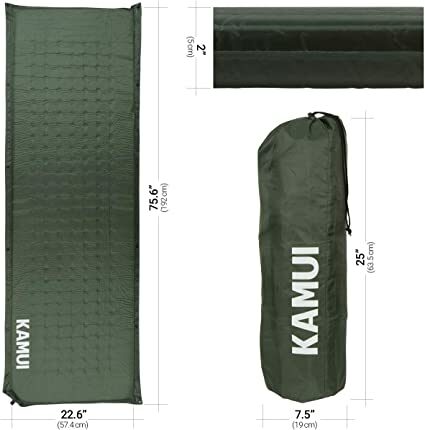

This is a lightweight and compact self-inflatable pad designed for campers and backpackers seeking comfort and insulation during their outdoor adventures. This sleeping pad features durable materials that provide excellent support and comfort for a restful night’s sleep. With an R-value of around 5.7, it offers maximum insulation for 4-season camping.
Pros:
- Quick and easy inflation and deflation with a large air valve
- Made from durable materials for longevity
- Suitable for 4-season camping
Cons:
- Not puncture-resistant
2. NEMO Switchback


This popular option offers similar comfort and insulation but with a focus on weight reduction.
Pros:
- Ultralight
- efficient design for heat retention
- good cushioning
- durable
- easy to fold and pack
Cons:
- Higher price point for a foam pad
3. Therm-a-Rest Z Lite Original


This closed-cell foam pad features a compact accordion-style design. It offers excellent durability and insulation with an R-value of 1.7.
Pros:
- Lightweight
- affordable
- doesn’t require inflation
- doubles as a sitting pad
Cons:
- Bulkier to pack compared to inflatable pads
- limited cushioning
4. Sea to Summit Comfort Plus SI


This self-inflating foam pad has a higher R-value of around 4.0 and features a unique Delta Core-V technology for improved comfort and insulation.
Pros:
- Self-inflating
- excellent insulation
- comfortable
- durable
- non-slip base
Cons:
- Relatively heavier and bulkier than basic foam pads
5. Featherstone Outdoor El Cordion


This foldable accordion-style foam pad boasts an innovative design, offering comfort, insulation (R-value around 2.1), and packability.
Pros:
- Lightweight
- efficient design for heat retention
- good cushioning
- durable
- easy to fold and pack
Cons:
- Slightly pricier than some other foam pads
6. Therm-a-Rest Z Lite SOL


An upgraded version of the Z Lite Sol, this pad features an aluminized surface for increased heat reflection and a higher R-value of around 2.
Pros:
- Enhanced insulation
- lightweight
- durable
- compact
- doubles as a sitting pad
Cons:
- Limited thickness may not suit all sleepers
7. Wakeman Foam Sleeping Pad


It offers reliable comfort for your outdoor adventures. Crafted with a closed-cell foam construction, this sleeping pad features a practical design that ensures durability and insulation during camping trips.
Pros:
- Lightweight, making it convenient for backpacking and camping
- Affordable, making it a cost-effective choice for outdoor enthusiasts
- No inflation required, simplifying setup and ensuring hassle-free use
Cons:
- Bulkier when packed compared to inflatable alternatives
- Provides limited cushioning compared to thicker mattresses
How To Choose Your Foam Pad?
To choose your foam sleeping pad for camping, consider the pad’s thickness, weight, and insulation properties to suit your comfort needs and the camping conditions. Look for foam pads with higher R-values for better insulation in colder environments.


Are foam mats good for camping?
Yes, foam mats are excellent options for camping due to their lightweight, durability, and affordability. They provide decent comfort and insulation, making them suitable for various camping adventures.
Are foam pads worth it?
Yes, foam pads are worth it for campers who prioritize simplicity, budget-friendliness, and durability. While they might not offer the same level of comfort as inflatable air pads, their reliability and insulation capabilities make them a valuable addition to any camper’s gear collection.
Conclusion
Of course, you will need different types of pads when camping in different settings. This means one sleeping pad for winter and another for summer, or even one pad for camping and the other for backpacking. In this case, you might consider both a Self Inflating Sleeping Pad and Foam Mat.
Our choice in terms of self-inflating sleeping mats is the KAMUI self-inflating sleeping pad. And next up is what sets it apart from the other sleeping pads out there, with its wide range of uses and possibilities:
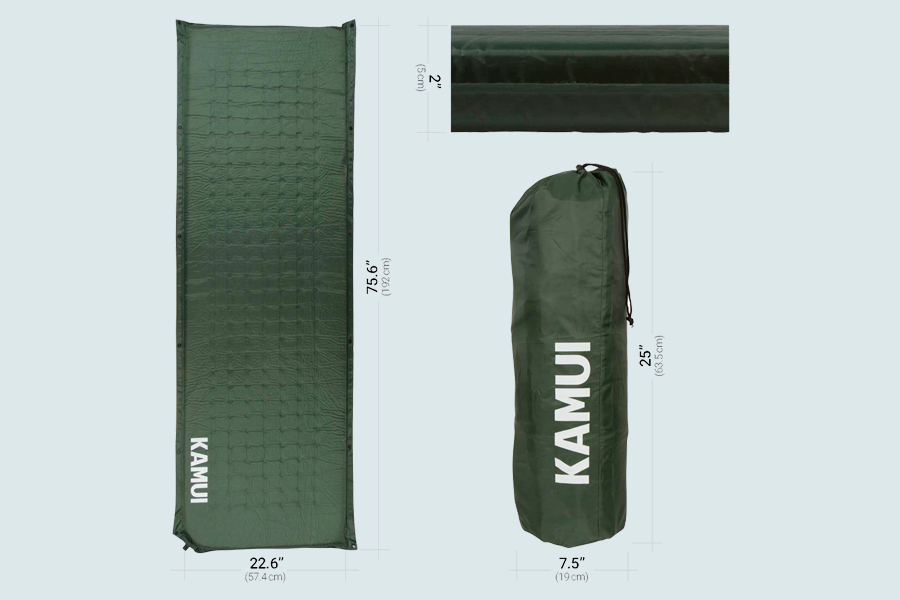

- Lightweight with just 3.5 lbs
- Simple and high quality
- For sleeping in all seasons with R-Value of 5.7
- For people up to 276 lbs and 6 ft
- With a self-inflating valve – less time spent inflating
Resources:
KAMUI Self-Inflating Sleeping Pad
- Connectable with multiple sleeping pads
- 4-season sleeping pad
- Provides great back support
- Comes with a storage bag
